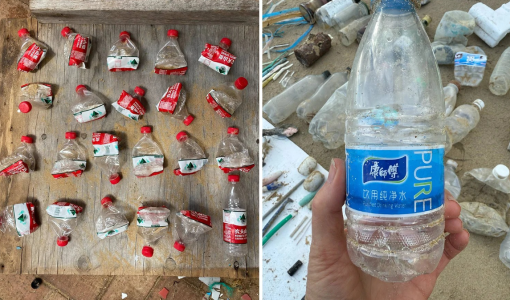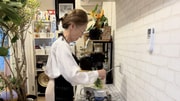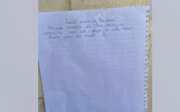Beachcomber Stumbles Onto Mysterious Object—The Truth Behind Its 11,000km Journey Will Shock You!
By
Gian T
- Replies 0
There’s something magical about a stroll along a remote Aussie beach—the salty air, the rhythmic crash of the waves, and the thrill of never quite knowing what the tide might bring in. But for one seasoned beachcomber, a recent walk turned into a globe-spanning mystery that highlights a much bigger problem lurking beneath the surface of our beautiful coastlines.
Colleen Hughson, a self-confessed 'serial beachcomber' and long-time volunteer, was out for a wander near Codrington, a quiet stretch of sand about four hours southwest of Melbourne. Accompanied by a 'rookie' beachcomber, Colleen’s sharp eyes landed on a brown plastic crate perched atop the sand. At first glance, it seemed like just another bit of flotsam, but a closer look revealed the words ‘Albany Bakery’ etched into its side.
Now, most of us would assume it hailed from Albany, the well-known Western Australian town. But Colleen’s memory was jogged—she’d found a broken crate with the exact same branding on a different beach three years earlier. Intrigued, she’d even tried to track down the bakery in Albany, only to discover it didn’t exist. The plot thickened!
Determined to get to the bottom of the mystery, Colleen did some online sleuthing. Her research led her far from the WA coast—all the way to Cape Town, South Africa. The crate, it turned out, was a perfect match for those used by a bakery in the South African port city, more than 11,000 kilometres away.
While it’s tempting to imagine the crate bobbing across the Indian Ocean for years, Colleen suspects a more likely explanation: it probably fell off a ship. The crate looked almost new, suggesting it hadn’t spent much time at sea. And, as Colleen knows all too well, international shipping debris is a common find along Australia’s southern coast.
Since founding the Warrnambool offshoot of Beach Patrol in 2017, Colleen and her team have collected all sorts of ocean-borne rubbish—everything from fishing gear to chemical drums, and even entire garbage bags filled with waste. Most of it, she says, comes from 'ocean activities' like fishing and shipping, rather than local litterbugs.
The problem isn’t unique to Australia. Beach cleaners worldwide are reporting similar finds, with a growing number of foreign-labelled bottles and packaging washing up on their shores. In fact, Colleen’s group launched a citizen science project called Bottles Overboard to track the origins of this debris. Their findings are sobering: about 80 per cent of the branded rubbish they collect—ranging from drink bottles to detergent containers—bears labels not sold in Australia. The majority, she notes, seem to come from China.
Marine ecologists have noticed the trend, too. Southern Cross University’s Stephen Smith told the ABC in 2023 that the number of overseas water bottles found on Aussie beaches has surged since the start of the Covid pandemic. It’s a global issue, and it’s getting worse.
But it’s not all doom and gloom. A 2022 study by the CSIRO found that local efforts, like organised beach clean-ups, have helped reduce Australia’s coastal litter by nearly 30 per cent in recent years. That’s a win worth celebrating! Still, Colleen believes much more needs to be done—especially when it comes to holding international shipping companies accountable.
She suspects some ships are dumping rubbish at sea to avoid hefty disposal fees at port. 'The cost of cleaning that up, and the damage that’s going to do now and into the future, that is such a bigger cost than allowing [ships] to bring their rubbish in and get it disposed of properly,' she argues. Unlike local littering, which carries the risk of fines or prosecution, dumping at sea is largely invisible and unpoliced.
Colleen is calling for more government action—a dedicated agency to tackle ocean plastic at its source, rather than leaving the burden to volunteers. 'It’s just completely left up to volunteers picking it up, trying to work out where it comes from, trying to stop it at the source,' she says. 'I would love to see a government department or agency with the sole purpose of trying to reduce plastic in the ocean.'
For many of us in the Seniors Discount Club, the beach is a place of fond memories—family holidays, fishing trips, or simply a quiet walk with the grandkids. But the growing tide of ocean rubbish threatens to spoil these special places for future generations. It’s a reminder that our actions, and those of people thousands of kilometres away, are all connected by the sea.
 Have you ever found something strange or surprising washed up on your local beach? Do you have any tips for reducing plastic waste, or ideas for how we can protect our coastlines? We’d love to hear your stories and suggestions—share them in the comments below!
Have you ever found something strange or surprising washed up on your local beach? Do you have any tips for reducing plastic waste, or ideas for how we can protect our coastlines? We’d love to hear your stories and suggestions—share them in the comments below!
Read more: This woman's bizarre find on a popular beach could change your weekend plans dramatically!
Colleen Hughson, a self-confessed 'serial beachcomber' and long-time volunteer, was out for a wander near Codrington, a quiet stretch of sand about four hours southwest of Melbourne. Accompanied by a 'rookie' beachcomber, Colleen’s sharp eyes landed on a brown plastic crate perched atop the sand. At first glance, it seemed like just another bit of flotsam, but a closer look revealed the words ‘Albany Bakery’ etched into its side.
Now, most of us would assume it hailed from Albany, the well-known Western Australian town. But Colleen’s memory was jogged—she’d found a broken crate with the exact same branding on a different beach three years earlier. Intrigued, she’d even tried to track down the bakery in Albany, only to discover it didn’t exist. The plot thickened!
Determined to get to the bottom of the mystery, Colleen did some online sleuthing. Her research led her far from the WA coast—all the way to Cape Town, South Africa. The crate, it turned out, was a perfect match for those used by a bakery in the South African port city, more than 11,000 kilometres away.
While it’s tempting to imagine the crate bobbing across the Indian Ocean for years, Colleen suspects a more likely explanation: it probably fell off a ship. The crate looked almost new, suggesting it hadn’t spent much time at sea. And, as Colleen knows all too well, international shipping debris is a common find along Australia’s southern coast.
Since founding the Warrnambool offshoot of Beach Patrol in 2017, Colleen and her team have collected all sorts of ocean-borne rubbish—everything from fishing gear to chemical drums, and even entire garbage bags filled with waste. Most of it, she says, comes from 'ocean activities' like fishing and shipping, rather than local litterbugs.
The problem isn’t unique to Australia. Beach cleaners worldwide are reporting similar finds, with a growing number of foreign-labelled bottles and packaging washing up on their shores. In fact, Colleen’s group launched a citizen science project called Bottles Overboard to track the origins of this debris. Their findings are sobering: about 80 per cent of the branded rubbish they collect—ranging from drink bottles to detergent containers—bears labels not sold in Australia. The majority, she notes, seem to come from China.
Marine ecologists have noticed the trend, too. Southern Cross University’s Stephen Smith told the ABC in 2023 that the number of overseas water bottles found on Aussie beaches has surged since the start of the Covid pandemic. It’s a global issue, and it’s getting worse.
But it’s not all doom and gloom. A 2022 study by the CSIRO found that local efforts, like organised beach clean-ups, have helped reduce Australia’s coastal litter by nearly 30 per cent in recent years. That’s a win worth celebrating! Still, Colleen believes much more needs to be done—especially when it comes to holding international shipping companies accountable.
She suspects some ships are dumping rubbish at sea to avoid hefty disposal fees at port. 'The cost of cleaning that up, and the damage that’s going to do now and into the future, that is such a bigger cost than allowing [ships] to bring their rubbish in and get it disposed of properly,' she argues. Unlike local littering, which carries the risk of fines or prosecution, dumping at sea is largely invisible and unpoliced.
Colleen is calling for more government action—a dedicated agency to tackle ocean plastic at its source, rather than leaving the burden to volunteers. 'It’s just completely left up to volunteers picking it up, trying to work out where it comes from, trying to stop it at the source,' she says. 'I would love to see a government department or agency with the sole purpose of trying to reduce plastic in the ocean.'
For many of us in the Seniors Discount Club, the beach is a place of fond memories—family holidays, fishing trips, or simply a quiet walk with the grandkids. But the growing tide of ocean rubbish threatens to spoil these special places for future generations. It’s a reminder that our actions, and those of people thousands of kilometres away, are all connected by the sea.
Key Takeaways
- A Victorian beachcomber found a bread crate labelled ‘Albany Bakery’ washed up near Codrington, which turned out to have originated from Cape Town, South Africa, highlighting the vast distances international shipping debris can travel.
- Volunteers regularly find a significant amount of foreign rubbish, including shipping and fishing debris, on the south coast of Australia, with around 80 per cent of branded waste originating from overseas.
- There has been a noticeable rise in international plastic waste, such as bottles and chemical drums, since Covid, with beach cleaners across the globe reporting similar trends.
- While organised clean-ups have reduced Australian coastal litter by nearly 30 per cent, volunteers say more needs to be done, calling on the government for stronger regulation and dedicated efforts to tackle ocean plastic pollution at its source.
Read more: This woman's bizarre find on a popular beach could change your weekend plans dramatically!








